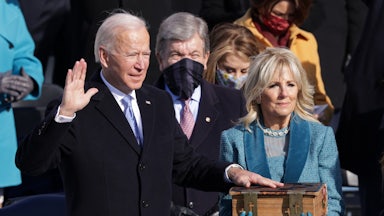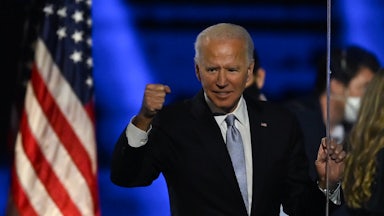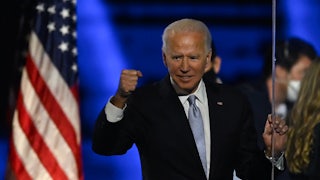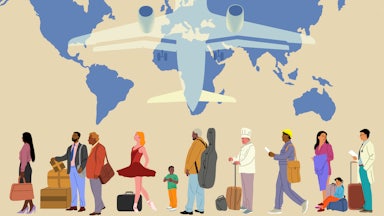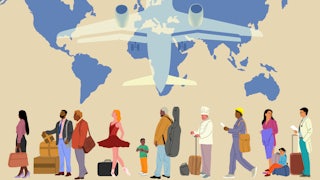“When was the last time we really had terms with which or the occasion for questioning the quality of people’s work?” Kathi Weeks, professor of Gender, Sexuality, and Feminist Studies at Duke University, asked when we spoke in December, which, at that point, had been the deadliest month so far of the Covid-19 pandemic, with 12 million workers’ unemployment benefits at risk, and the virus still spiking. “And not just the quality of what the labor process is like—is it a good job? Is it a bad job?—or the remuneration, but does the work have any purpose?” The pandemic gives us an opportunity to ask questions usually submerged under the presumption that work is fundamentally valuable. Jobs are often tautologically self-justifying; work is good, because it’s good to work. “Nobody asks what jobs or what would be the output of these jobs. Do we need the output? No, we just need the jobs so we don’t care about the output,” Weeks said.
The Covid-19 pandemic has only accelerated this questioning—a return to an understanding of work as a site of struggle, not liberation. It has also introduced a new kind of laborer: the “essential worker,” tying together workers who typically are not seen as having a shared fate, from grocery store cashiers to nurses, food app delivery drivers to teachers. Workers in meatpacking plants, in Amazon warehouses, in critical infrastructure have been recognized as fundamental in maintaining society as we know it, even as their labor is demeaned and their lives endangered. The Economic Policy Institute (EPI) estimates that there are more than 55 million workers across 12 industries who now share this label: 70 percent didn’t have a college degree; one in eight were covered by a collective bargaining agreement. In frontline essential work, the Center for Economic and Policy Research found, women and people of color are overrepresented (disaggregated data on women of color was not presented). They also found that one-third of essential workers live in low-income families.
Essential work, as a category, crosses divides, as Weeks pointed out. At the same time, it may also update the outmoded image of the mythic working class as personified by a white, male, blue-collar, industrial worker to a more accurate representation. Yet saying work is essential is not the same thing as saying it is good. It’s to recognize that there is a social value to the work beyond its ability to generate profit. It can be easy to fall into a kind of saccharine heroism over essential workers: the yard signs, the applause at 7 o’clock (which also faded long before the pandemic had given any indication of slowing). With women whose essential work is care work, the deification can lead paradoxically to making their work invisible, as if nurses and teachers are just doing what comes naturally, “doing what they love.”
“There’s always that tension, said Weeks. “That’s still why I think Wages for Housework is so interesting.” Wages for Housework emerged in the 1970s, a network of autonomous feminist groups spanning multiple countries, and demanded that what’s been defined as “women’s work” in the domestic sphere be understood as necessary for reproducing society, and be recognized for its value. It was an analysis and objective that stood quite in contrast to both the male-dominated left and liberal feminism, as Sarah Jaffe wrote in The Nation, “both of which have long excluded the home and the processes of social reproduction from their activism and thinking.” Wages for Housework, Weeks said, could work effectively within that tension, “with that demand for wages, which is ‘this is real work, and as real work we should get paid.’ But also, it’s just work, it’s just a job. So they are also trying to demote it in that way, too.”
While some are asking how to restore women’s work/life balance after the pandemic has thrown it into disarray, or why men (these concerns are often so married and heterosexual) aren’t doing their share of the other work done at home, Weeks prompts us to ask, What was so great about the work/life balance anyway? Did it ever exist? And who did it serve? At the same time, if now some of the work of social reproduction—caring, teaching, nursing—is now recognized as the truly essential work it is, how might that redefine all of our relationships to work? “The Covid crisis has clarified and made more visible some of the existing problems with the wage and family system—as the way that most of us gain access to income is either through work or through our family relations, or the family then distributes some of those wages,” said Weeks. “And that’s a terrible system.”
Wages for Housework was an opening; Covid is another kind, one that could lead to that kind of big demand. “In order to make political demands, they have to be both immediately legible and a little mysterious so that people actually have to work to understand them,” said Weeks. “But it requires these openings so people can even listen to what it is.”
Ten years after the publication of Week’s landmark book The Problem with Work: Feminism, Marxism, Antiwork Politics, and Postwork Imagainaries, it could be read as a deep retort to the corporate feminist valorization of work as a pathway to empowerment and equality, and in fact preceded the aggressive marketing of girlboss brands like Lean In and The Wing. Weeks’ work points in a different direction, using a feminist and Marxist analysis to argue against the idealization of work as where we find ourselves and as what defines our value.
“We’re supposed to love our work,” Weeks told me. But between overwork, not enough work, the way work depletes us, the way work spills over into every corner of our lives, “If you add up those problems, every single person is suffering from work.” That’s something that crosses different kinds of work, the way that “essential worker” draws together grocery store workers and delivery workers and teachers and nurses. That’s a potentially enormous constituency of workers we’ve just named out of a crisis. Rather than fighting for the workers because they are heroic, we could instead ask, as Weeks posed it, “Why do you think that they have to be heroes to actually sustain themselves in the context of those job conditions?”

